Introduction
Machine learning (ML) is rapidly transforming several industries. From healthcare to finance, its impact is profound. Companies leverage machine learning to analyze data, predict trends, and make informed decisions. Learning ML has become crucial for anyone interested in a career in data. There are a large number of digital learning platforms and resources available today to learn ML. In this article, we have listed the 6 best college courses to learn machine learning for free.
Importance of machine learning in today's data-driven world
We live in a world full of data. Every click, purchase and interaction generates data. Machine learning helps make sense of this big data. It helps companies improve products, personalize interactions, and predict customer behavior. Recommendation systems, for example, increase consumer satisfaction by making product or movie recommendations based on previous users' selections.
Machine learning can be used in the medical profession to forecast disease outbreaks and personalize treatment regimens. Financial institutions use it to assess risks and detect fraud. Autonomous vehicles use ML to make decisions and navigate in real time. Machine learning has infinite potential, making it a necessary skill in today's environment.
An overview of free educational resources from top universities
Top universities offer free online courses on machine learning. These classes cover a wide range of topics, from fundamental ideas to sophisticated methods. They offer practical, real-world experience and are created by professionals.
Anyone, regardless of their origin, can enroll in these courses. These are great resources whether you want to learn more or are just getting started. Start your adventure now and discover the fascinating field of ML.
6 free machine learning courses taught by universities
1. Introduction to artificial intelligence with Python from Harvard CS50
“Harvard”CS50 Introduction to artificial intelligence with Python” is a comprehensive course designed to provide fundamental knowledge in artificial intelligence (ai). This course covers key concepts and algorithms that underpin modern ai technologies and includes hands-on projects using Python.
Course structure and learning path
The course is structured to take students through the essential elements of ai. Starting with basic concepts, gradually progress to more complex topics, ensuring a deep understanding of each area. Students will participate in video lectures, readings, and hands-on projects to solidify their learning.
This course emphasizes practical applications, allowing students to apply ai concepts directly through Python programming. By working on projects, students gain hands-on experience and learn to implement ai algorithms and techniques.
Core Topics Covered
- Graph Search Algorithms
- Classification
- Improvement
- Reinforcement learning
- Machine learning libraries
- game engines
- Handwriting recognition
- translation machine
2. Stanford CS229: Machine Learning
“Stanford”CS229: Machine LearningThe course is one of the most recognized programs in the field. This course is designed to provide a deep understanding of ML concepts and techniques, suitable for both beginners and experienced students.
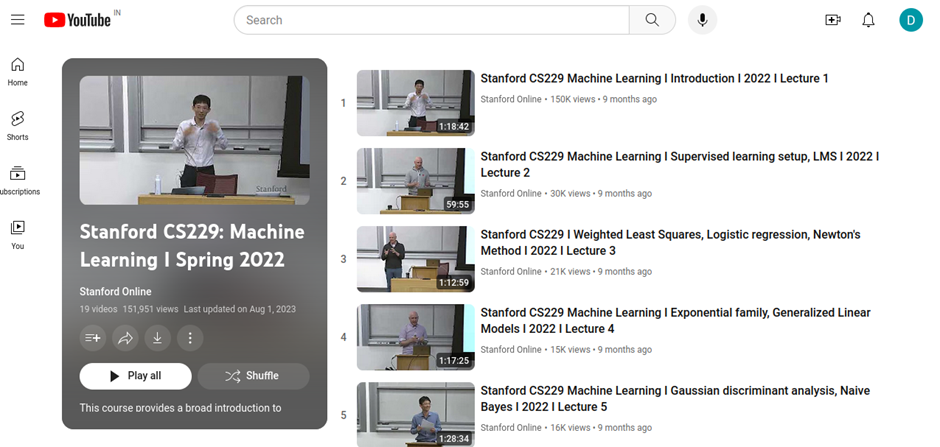
Course structure and learning path
CS229 at Stanford covers a wide range of topics, allowing students to explore various learning paradigms and techniques. The course is well structured to help students build predictive models and understand the theoretical foundations of machine learning.
Core Topics Covered
- Supervised learning
- Unsupervised learning
- Deep learning
- Generalization and Regularization
- Reinforcement learning and control
3. MIT Introduction to Machine Learning Course
This introductory course from MIT, titled “Introduction to machine learning”can be taken by students eager to delve deeper into ML. The course, available through the MIT Open Learning Library, covers several topics that are vital to gaining knowledge of ML concepts and methods. Please note that courses listed in the MIT Open Learning Library do not offer course completion certificates.
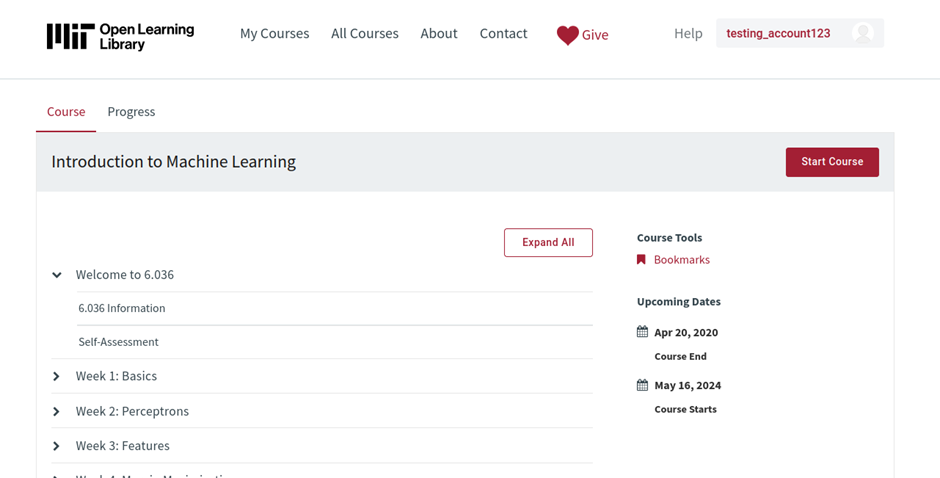
Course structure and learning path
This course provides an introduction to ML principles, algorithms, and applications, focusing on modeling and prediction. It covers the formulation of learning, representation, overfitting and generalization problems, with practical supervised and reinforcement learning exercises applied to images and temporal sequences.
The course format includes lectures, notes, exercises, laboratories and homework problems, with the aim of equipping students with the ability to formulate well-specified machine learning problems and perform relevant learning techniques.
Core Topics Covered
- Linear classifiers
- perceptrons
- Margin Maximization
- Regression
- Neural networks
- Convolutional neural networks
- State machines and Markov decision processes
- Reinforcement learning
- Recommendation systems
- Decision trees
- Nearest neighbors
4. Harvard Data Science Course: Machine Learning
Harvard offers a practical and engaging approach to machine learning through its “Data Science: Machine Learning” course. This course is part of Harvard's Data Science Professional Certificate Program and focuses on practical applications and real-world problems.
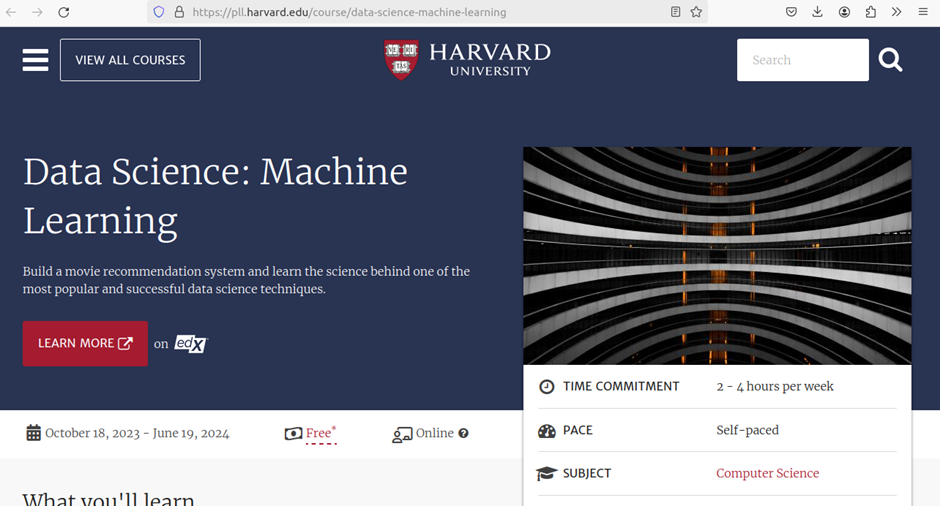
Course structure and learning path
The Harvard course stands out for its focus on practical learning. Instead of just theoretical concepts, it emphasizes the development of practical skills. The course teaches popular machine learning techniques and algorithms by creating a movie recommendation system. This project-based learning approach helps students understand complex concepts by applying them to real-world scenarios.
Core Topics Covered
- Machine learning algorithms
- Principal component analysis
- Regularization
- Training data
- Algorithm training
- Overtraining and cross validation
5. University of Michigan Applied Machine Learning with Python
The University of Michigan offers an excellent course titled “Applied machine learning with Python.”This course is available on Coursera and is part of the Applied Data Science with Python specialization. Provides a practical approach to machine learning, focusing on the use of Python and scikit-learn.
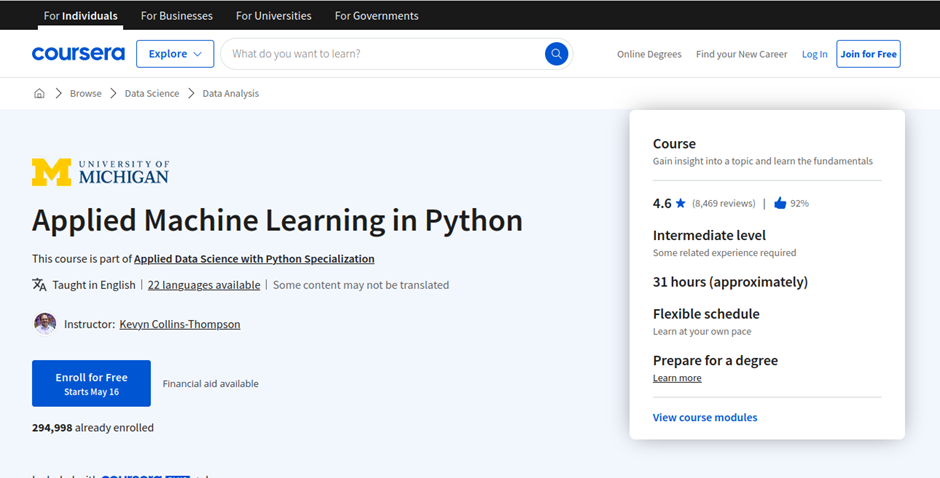
Course structure and learning path
The course is designed to take students step-by-step through the fundamentals of statistical learning, working from simpler to more complex topics. To support the content and provide a real-world experience, each session combines texts, video lectures, and hands-on activities.
This course's emphasis on real-world applications is one of its main features. Students use Jupyter Notebook and Python to work on practical assignments and projects. This practical method ensures that students understand theoretical ideas and are able to apply them in real-world situations.
Core Topics Covered
- Model evaluation and selection
- Naive Bayes, random forest and gradient boosting
- Unsupervised learning techniques
6. Stanford Statistical Learning with Python
Stanford offers a detailed course titled “Statistical learning with Python.”This course is available on edX and provides an in-depth understanding of statistical learning techniques using Python. It covers essential tools for data science and statistical modeling, making it a valuable resource for anyone looking to deepen their knowledge in this area.
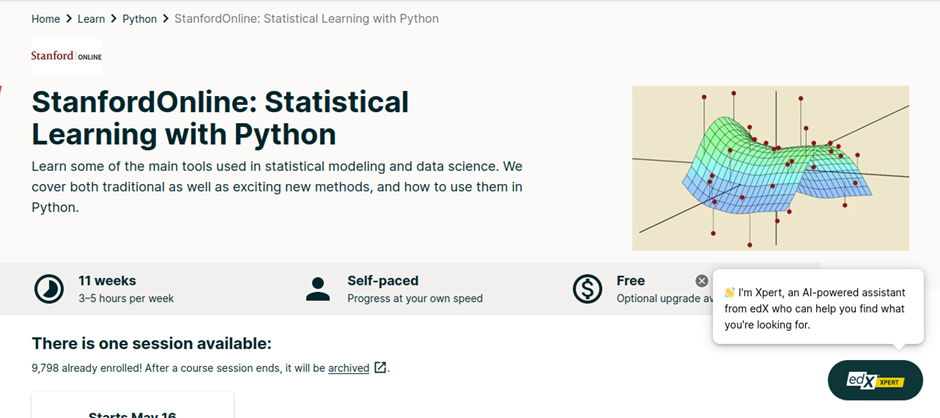
Course structure and learning path
The course is structured to guide students through the fundamentals of statistical learning, starting with basic concepts and gradually progressing to more advanced topics. Each section includes a combination of video lectures, readings, and hands-on exercises designed to reinforce the material and provide hands-on experience.
A key feature of this course is its emphasis on practical applications. Using Python and Jupyter Notebook, students work on real-world projects and exercises. This practical approach ensures that students not only understand the theoretical concepts but also know how to implement them in practice.
Core Topics Covered
- Linear regression
- Classification
- Resampling
- Linear model selection
- Tree-based methods
- Unsupervised learning
- Deep learning
Conclusion
It is more crucial than ever to understand machine learning in today's data-driven world. A good place to start are courses offered by prestigious universities such as Harvard, MIT, Stanford, and the University of Michigan. And now you know they offer free machine learning courses!
These courses help develop practical skills, provide practical experience and cover important topics. Anyone, from any background, can access higher education with these free courses. These tools are really useful whether you are new to the profession or want to learn more. Harness the potential of ML to drive innovation and revolutionize industries by starting your journey with it today.
 NEWSLETTER
NEWSLETTER




